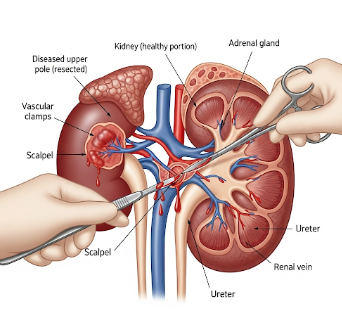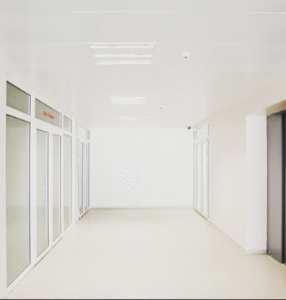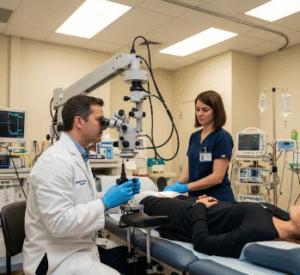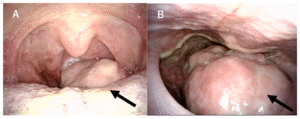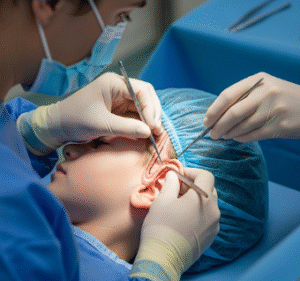Overview
Heminephrectomy is a surgical procedure that involves removal of a part of the kidney, typically one pole, while preserving the remaining healthy renal tissue. It is usually performed for kidney tumors, congenital anomalies, severe infection, or non-functioning segments of the kidney.
South Korea is renowned for advanced urologic surgical techniques, minimally invasive laparoscopic procedures, and comprehensive post-operative care, making it a preferred destination for patients seeking safe, precise, and effective kidney-sparing surgery.
What is Heminephrectomy?
Heminephrectomy involves:
- Partial removal of the kidney (upper or lower pole)
- Preservation of healthy renal tissue to maintain kidney function
- Minimally invasive approach using laparoscopy or robotic-assisted surgery whenever possible
- Optional removal of associated ureteral segment if affected
Indications include:
- Localized kidney tumors (renal cell carcinoma)
- Non-functioning kidney segments due to congenital anomalies
- Severe infections or abscesses confined to one part of the kidney
- Obstructive uropathy or stones causing irreversible damage in one portion of the kidney
What are the Benefits?
- Preserves healthy kidney tissue → Maintains overall renal function
- Minimally invasive techniques → Smaller incisions, less pain, and faster recovery
- Effective treatment of localized kidney problems → Tumor removal or infection control
- High surgical precision in Korea → Experienced urologists and advanced robotic systems
- Reduced risk of chronic kidney disease compared to total nephrectomy
- Comprehensive post-operative care → Includes monitoring, imaging, and rehabilitation
Procedure Details
1) How should I prepare for Heminephrectomy?
- Preoperative evaluation → Blood tests, renal function tests, CT/MRI scan, ECG, and urine analysis
- Medication instructions → Adjust or stop blood thinners, NSAIDs, or specific medications
- Fasting → Typically 8–12 hours before surgery
- Pre-operative consultation → Discuss surgical approach (open, laparoscopic, robotic), risks, recovery, and long-term kidney function
- Infection prevention → Prophylactic antibiotics may be prescribed
2) What happens during the procedure Heminephrectomy?
- Anesthesia → General anesthesia with continuous monitoring
- Surgical steps →
- Kidney identified and exposed via laparoscopic or open approach
- Diseased or non-functioning portion carefully dissected and removed
- Blood vessels and ureter associated with the removed segment ligated
- Remaining kidney tissue preserved and checked for function
- Closure of incisions and placement of drainage tubes if necessary
- Duration → 2–4 hours depending on complexity
- Monitoring → Vital signs, urine output, and kidney perfusion monitored during surgery
3) What happens after Heminephrectomy?
- Recovery room → Patient monitored until fully awake and stable
- Hospital stay → Typically 3–7 days depending on procedure type and recovery
- Pain management → Oral or IV analgesics; minimally invasive approach reduces pain
- Activity restrictions → Avoid heavy lifting and strenuous activity for 4–6 weeks
- Diet → Normal diet gradually resumed; hydration encouraged for kidney health
- Follow-up visits → Monitor kidney function, wound healing, and imaging to ensure complete recovery
Risks / Benefits
Risks
- ➤ Bleeding or hematoma formation
- ➤ Infection at the surgical site or urinary tract
- ➤ Injury to surrounding organs (bowel, spleen, liver, or vessels)
- ➤ Reduced kidney function if remaining tissue is insufficient
- ➤ Blood clots or anesthesia-related complications
- ➤ Rare need for conversion to total nephrectomy
Benefits
- ➤ Preserves kidney function while removing diseased tissue
- ➤ Minimally invasive techniques reduce recovery time and pain
- ➤ Effective treatment for tumors, infections, or congenital anomalies
- ➤ High surgical precision in Korea ensures optimal outcomes
- ➤ Comprehensive post-operative care and monitoring
Recovery and Outlook
- Immediate recovery → Mild pain at incision sites, fatigue, and temporary urinary changes
- Hospital stay → 3–7 days depending on procedure and patient health
- Diet and hydration → Gradual resumption of normal diet; fluid intake encouraged
- Return to normal activity → Light activity in 1–2 weeks; full recovery in 4–6 weeks
- Long-term outlook → Excellent when surgery is successful; kidney function preserved in most cases
- Follow-up care → Regular imaging and renal function tests to monitor remaining kidney
- Lifestyle adjustments → Healthy diet, avoidance of nephrotoxic drugs, and routine check-ups
South Korea provides comprehensive post-operative care, including pain management, imaging, rehabilitation, and close monitoring for kidney function, ensuring safe recovery and optimal long-term outcomes.
When To Call the Doctor
Contact your surgeon immediately if you notice:
- ⚠️ Fever, chills, or signs of infection
- ⚠️ Persistent abdominal or flank pain
- ⚠️ Blood in urine or decreased urine output
- ⚠️ Swelling, redness, or unusual drainage at incision sites
- ⚠️ Dizziness, weakness, or symptoms of reduced kidney function
Best Korea Option / Process
South Korea is a leading destination for Heminephrectomy due to:
- Highly skilled urologists with extensive experience in kidney-sparing surgery
- Advanced laparoscopic and robotic-assisted surgical technology
- Comprehensive post-operative care including imaging, renal monitoring, and rehabilitation
- Shorter hospital stays and faster recovery due to minimally invasive techniques
- International patient support, including language assistance, coordination, and follow-up care
Top Hospitals for Heminephrectomy in Korea:
- Asan Medical Center, Seoul – Expertise in urologic oncology and kidney-sparing surgery
- Samsung Medical Center – Advanced laparoscopic and robotic heminephrectomy
- Seoul National University Hospital (SNUH) – Comprehensive care and post-operative monitoring
- Yonsei Severance Hospital – High success rates in complex kidney procedures
👉 For patients with localized kidney disease or tumors, Heminephrectomy in Korea offers safe, precise, and highly effective treatment with excellent long-term outcomes.

